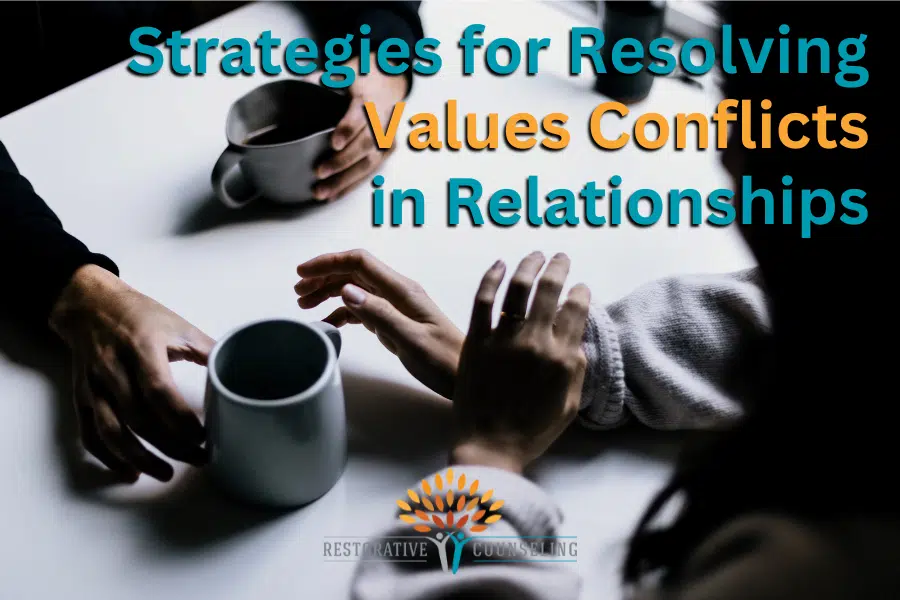Written by Jordan Meehan, LCSW
In a relationship, it’s not uncommon for romantic partners to find themselves involved in conflicts arising from differences in values. Whether it’s different beliefs about money, career aspirations, family dynamics, or even fundamental principles of living, these conflicts can be challenging to navigate. However, with the right strategies, it is possible to transform these clashes into opportunities for growth and understanding. Resolving values conflicts in relationships is key to ensuring that your relationship has the opportunity to succeed, long-term. The following strategies will help guide you and your partner(s) towards greater fulfilment and fewer values conflicts in your relationship.
Open Communication: The Foundation of Understanding
The cornerstone of any healthy relationship is open communication. When faced with conflicts about values, it’s crucial to create a safe space for everyone to express their thoughts and feelings without fear of judgment. Practice active listening – not just hearing, but truly understanding your partner’s perspective. Instead of immediately formulating a response, take the time to absorb what they’re saying. Once you have taken this step, you can mindfully respond based on what they have communicated to you. This fosters empathy and lays the groundwork for a constructive conversation.
Define and Understand Core Values
Begin by identifying and articulating your own core values, and encourage your partner(s) to do the same. This process involves reflecting on what matters most to you in life – be it honesty, loyalty, ambition, spirituality, or any other principle that guides your decisions. Once you have a clear understanding of your own values, it becomes easier to comprehend the motivations behind others’ actions and beliefs. This self-awareness can be a powerful tool in resolving conflicts.
Need help identifying and communicating your values?
Practice Empathy and Perspective-Taking
Empathy is a powerful tool in resolving values conflicts. Put yourself in your partner’s shoes and attempt to see the world through their eyes. Understanding their experiences, upbringing, and personal history can provide context to their values. Similarly, share your own background and experiences to illustrate the factors shaping your beliefs. This mutual exchange fosters a deeper connection and can show commonalities that bind your various perspectives.
Mindfulness and Self-Reflection
In the midst of a conflict, practicing mindfulness can be a powerful strategy. Take a moment to breathe and center yourself before engaging in discussions about values. This strategy can enhance self-awareness, making it easier to navigate through the emotions associated with conflicting beliefs. Regular self-reflection also allows each partner to assess their own values, ensuring that they remain authentic and aligned with their evolving selves.
Seek Common Ground and Reinforce Shared Goals
To better move through conflict, it is essential to both recognize shared goals and emphasize common values. These goals, encompassing future aspirations like building a family or pursuing joint hobbies, serve as a powerful means to create unity amid conflicts. Revisiting shared objectives reinforces the idea that partners, despite differences, are moving towards a common purpose. Additionally, it is crucial to acknowledge and focus on areas where values align. This shared ground acts as a bridge during conflicts, serving as a reminder of the deeper connection that binds partners together. Emphasizing commonalities helps ensure smoother navigation through disagreements, ultimately strengthening the overall health of the relationship.
Compromise and Find Middle Ground
In relationships, compromise is not a sign of weakness; rather, it’s a demonstration of your commitment to making the relationship work. Values conflicts often require finding a middle ground that respects all partners’ beliefs. This doesn’t mean sacrificing your principles; instead, it involves finding resolutions that honor multiple perspectives. The key is to approach compromise with a mindset of collaboration.
Set Boundaries and Prioritize Self-Care
While compromise is crucial, it’s equally important to establish and respect individual boundaries. Each partner should have the space to pursue their interests, values, and self-care routines. It’s essential to prioritize your mental and emotional well-being to bring your best self to the relationship. Healthy boundaries contribute to a more harmonious connection and can prevent values conflicts from escalating.
Time and Patience: Allow for Growth
Resolving values conflicts is not an overnight process. It requires time, patience, and a commitment to growth. Understand that both you and your partner(s) are evolving individuals, and your values may shift over time. Embrace change as an opportunity for mutual growth and be patient with each other as you navigate conflicting values.
Establish a Resolution Framework
In the heat of a conflict, it can be challenging to find a resolution. Establishing a resolution framework beforehand, when emotions are calm, can provide a roadmap for addressing conflicts constructively. This framework may include agreed-upon communication strategies, compromise techniques, and guidelines for seeking outside support when necessary. Having a predefined plan can make the process more manageable during challenging moments.
Counseling and Professional Guidance
If values conflicts persist, if any partner is struggling to understand their values, or if communication is generally challenging, seeking the guidance of a therapist can be invaluable. A licensed clinician can provide insights, feedback, and skill-building in an objective manner. Professional guidance can equip you or your partner(s) with the tools needed to navigate values exploration and develop strategies for resolving conflicts effectively.
In every relationship, conflicts are inevitable, especially when it comes to navigating differences in values. However, these conflicts do not need to be the downfall of a relationship. Instead, they can be opportunities to build deeper understanding and connection.
Restorative Counseling can help you develop strategies for overcoming conflict in your relationship.
By learning strategies such as open communication, seeking common ground, embracing compromise, and prioritizing self-care, you can navigate values conflicts and emerge more deeply connected to your partner(s). Restorative Counseling’s team of clinicians can help you learn how to use these tools to aid you in feeling greater fulfilment in your relationship. Remember, the journey of resolving conflicts is as important as the destination, and it is through this journey that relationships truly thrive. Schedule an appointment today to get started.

Hi, I’m Jordan!
I partner with teens and adults to treat concerns related to trauma, anxiety, and relationships utilizing CBT, ACT, and EMDR approaches. Read more about me.
Follow Restorative Counseling
Sign up for our newsletter

